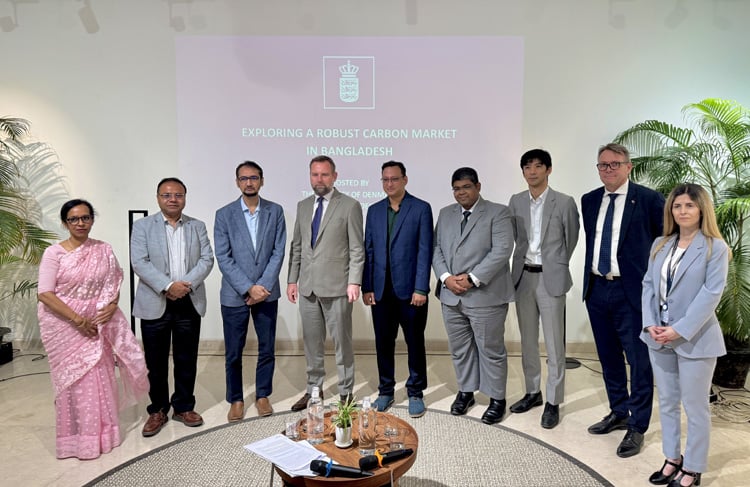News Flash

DHAKA, Oct 23, 2025 (BSS) - Danish Ambassador to Bangladesh Christian Brix Moller today said Bangladesh can turn its climate vulnerabilities into economic opportunities by leveraging carbon markets and utilizing its position as one of the world's most climate-vulnerable but low-carbon-emitting nations.
"With the right partnerships and policies, Bangladesh can turn climate challenges into sustainable and inclusive growth. Carbon markets can play a central role in this transformation," he said.
The envoy made the remarks as the Denmark embassy here hosted a dialogue titled "Climate Talk: Exploring a Robust Carbon Market in Bangladesh" today at Bay Edge Gallery in Gulshan, according to a press release issued by the Danish Embassy.
The ambassador highlighted that while Bangladesh contributes less than 0.4% of global greenhouse gas emissions, it faces some of the world's most severe climate risks.
"This can be seen as climate injustice, but also as an opportunity for leadership and investments," he observed.
Reiterating Denmark's commitment to supporting Bangladesh's green transition, he said a credible and effective carbon market will require strong institutions, clear policies, and close collaboration among the government, private sector, civil society, and international partners.
The event brought together over 80 participants, and the panel session featured representatives from the Government of Bangladesh, private sector, academia, and development community to explore opportunities and challenges in developing a credible and inclusive carbon market for the country.
The event featured a keynote presentation by Consultant and Carbon Market specialist Shaymal Barman, who discussed the global relevance of carbon markets.
"Carbon trading is not only a mechanism for reducing emissions but also a powerful tool to mobilize investment for sustainable development. For countries like Bangladesh, establishing a credible carbon market can create pathways for economic growth while meeting climate goals such as Nationally Determined Contribution," he stated.
Followed by a panel discussion, representatives from government, academia, and the private sector explored policy frameworks, institutional readiness, private sector engagement, and strategies to ensure transparency and credibility in the carbon market.
Participants discussed how carbon trading can drive low-carbon development, enhance corporate sustainability, and support Bangladesh's Nationally Determined Contributions under the Paris Agreement.
Director of Climate Change and International Convention at the Department of Environment Mirza Shawkat Ali emphasized Bangladesh's critical role in global climate action.
"Bangladesh has the opportunity to position itself as the forerunner in climate solutions among the developing countries. Bangladesh is currently developing a Carbon Market Framework and we hope we can attract investment, promote innovation, and ensure that climate initiatives promote low carbon development and benefits the local communities and the economy," he said.